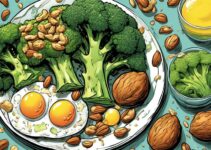Feeling low energy and looking to increase your testosterone levels without resorting to synthetic supplements? Look no further. The key to naturally boosting your testosterone production may lie in something as simple as your daily vitamin intake. But which vitamins should you be focusing on? It's not just about popping a generic multivitamin and hoping for the best. There are specific vitamins that have been shown to have a direct impact on testosterone levels. Want to know more about these essential vitamins and how they can potentially help you? Keep on reading.
Key Takeaways
- Sufficient levels of vitamin D can positively impact testosterone levels.
- Vitamin B6 plays a vital role in testosterone biosynthesis and supports energy metabolism.
- Adequate levels of Vitamin K2 are linked to optimized testosterone production and support testicular health.
- Adequate intake of Vitamin C, Vitamin E, and zinc are crucial for healthy testosterone levels.
Vitamin D
To naturally boost testosterone levels, consider incorporating vitamin D into your daily regimen as studies have shown a potential link between vitamin D and testosterone production. Vitamin D is a crucial nutrient that plays a significant role in various bodily functions, including the regulation of testosterone levels. Research has indicated that individuals with sufficient levels of vitamin D tend to have higher testosterone levels compared to those who are deficient in this essential vitamin.
One of the primary sources of vitamin D is sun exposure. When your skin is exposed to sunlight, it triggers the production of vitamin D in your body. This, in turn, can positively impact your testosterone levels. Studies have shown that individuals who spend more time outdoors and receive an adequate amount of sunlight tend to have higher testosterone levels. Therefore, ensuring that you get regular sun exposure can be an effective way to naturally enhance your testosterone production.
In addition to sun exposure, incorporating vitamin D-rich foods or supplements into your diet can also contribute to optimizing your testosterone levels. Foods such as fatty fish, egg yolks, and fortified dairy products are good sources of vitamin D. However, if your diet lacks an adequate amount of vitamin D, taking supplements may be necessary to maintain optimal levels for testosterone production.
Vitamin B6
You may be interested to learn about the role of Vitamin B6 in naturally boosting testosterone levels. This essential nutrient plays a crucial role in hormone regulation, including testosterone production. Furthermore, understanding the recommended daily intake and food sources of Vitamin B6 can help you optimize your dietary choices for overall hormonal health.
Benefits of Vitamin B6
Studying the benefits of Vitamin B6 reveals its crucial role in supporting testosterone production and overall hormonal balance within the body. Vitamin B6 benefits are essential for maintaining optimal testosterone levels and promoting overall health. Here are the key advantages of Vitamin B6 for testosterone production:
- Enhanced Testosterone Synthesis: Vitamin B6 plays a vital role in the biosynthesis of testosterone, aiding in the conversion of androgens into testosterone.
- Regulation of Hormonal Activity: This vitamin helps regulate the activity of various hormones, including testosterone, promoting balance within the endocrine system.
- Improved Energy Levels: Vitamin B6 supports energy metabolism, enhancing overall vitality and stamina, which are essential for healthy testosterone levels.
These benefits underscore the importance of Vitamin B6 in supporting testosterone production and maintaining hormonal equilibrium within the body.
Food Sources
Vitamin B6, being a crucial factor in testosterone production and hormonal balance, can be obtained from a variety of food sources. Incorporating B6-rich foods into your diet can support healthy testosterone levels. Here's a table listing some top food sources of Vitamin B6:
| Food Sources | Vitamin B6 Content (mg) |
|---|---|
| Chickpeas | 1.1 |
| Tuna | 0.9 |
| Chicken breast | 0.5 |
| Sunflower seeds | 0.5 |
| Pistachio nuts | 0.5 |
These foods can be easily incorporated into your meals, and by doing so, you can naturally boost your Vitamin B6 intake, supporting testosterone production. Additionally, consider exploring testosterone-boosting recipes and nutritional supplements rich in Vitamin B6 to further enhance your testosterone levels.
Recommended Daily Intake
In considering the recommended daily intake of Vitamin B6, it is important to recognize the dietary guidelines that support optimal hormonal balance and testosterone production. Vitamin B6 plays a crucial role in maintaining hormone levels and supporting overall health. The Recommended Dietary Allowance (RDA) for Vitamin B6 is as follows:
- For Adult Males: The RDA for Vitamin B6 is 1.3 milligrams per day. This can be easily obtained through a balanced diet, including foods such as poultry, fish, nuts, and fortified cereals.
- For Adult Females: The RDA for Vitamin B6 is also 1.3 milligrams per day. Incorporating Vitamin B6-rich foods into your diet can help meet this requirement.
- Consider Supplements: If it's challenging to get enough Vitamin B6 through food sources, recommended supplements can be a natural alternative to ensure adequate intake.
Ensuring you meet the recommended daily intake of Vitamin B6 can contribute to supporting healthy testosterone levels.
Vitamin K2
You may be interested to learn about the relationship between testosterone and Vitamin K2, as research suggests that Vitamin K2 plays a role in maintaining healthy testosterone levels. Additionally, Vitamin K2 has been linked to various health benefits, including cardiovascular health and bone strength. When it comes to incorporating Vitamin K2 into your diet, foods like grass-fed dairy, egg yolks, and fermented soy products are excellent sources of this essential nutrient.
Testosterone and Vitamin K2
Research has shown a correlation between adequate levels of Vitamin K2 and optimized testosterone production in men. Vitamin K2 plays a crucial role in testosterone regulation, and its supplementation can positively impact testosterone levels. Here's how Vitamin K2 influences testosterone production:
- Regulation of Testosterone: Vitamin K2 regulates testosterone production by activating enzymes responsible for testosterone synthesis in the testes.
- Reduced Testosterone Decline: Adequate levels of Vitamin K2 have been linked to a slower decline in testosterone levels as men age, contributing to overall hormonal balance.
- Improved Testicular Function: Vitamin K2 supports testicular health, enhancing the organ's ability to produce testosterone efficiently.
Incorporating Vitamin K2 into your diet or through supplementation may aid in maintaining optimal testosterone levels, supporting overall male reproductive health.
Benefits of Vitamin K2
Vitamin K2 demonstrates significant potential in positively influencing various physiological processes, particularly in relation to hormonal regulation and bone health. One of the key benefits of Vitamin K2 is its role in directing calcium to the bones and preventing its accumulation in soft tissues. Research suggests that adequate levels of Vitamin K2 can contribute to maintaining bone density and reducing the risk of fractures. Additionally, Vitamin K2 is believed to support cardiovascular health by preventing arterial calcification. Some studies have also indicated its potential in supporting testosterone production and activity. While specific dosage recommendations for Vitamin K2 may vary based on individual health factors, general guidelines suggest a daily intake of around 100-200 micrograms for adults. It's important to consult with a healthcare professional to determine the appropriate dosage for your specific needs.
Food Sources of K2
Rich dietary sources of K2 include fermented foods such as natto, sauerkraut, and certain cheeses, providing a natural means of incorporating this essential nutrient into your diet.
Benefits of K2-Rich Foods
- Supports Bone Health: K2 helps in activating osteocalcin, a protein essential for bone mineralization, reducing the risk of fractures and osteoporosis.
- Cardiovascular Health: K2 is associated with reducing arterial calcification, promoting heart health, and decreasing the risk of coronary artery disease.
- Enhanced Testosterone Production: K2 is linked to increased testosterone levels, contributing to improved muscle strength and physical performance.
Incorporating these K2-rich foods into your diet can provide numerous health benefits. While K2 supplements are available, obtaining K2 from natural food sources ensures a well-rounded intake of nutrients.
Vitamin C
Increasing your intake of Vitamin C has been shown to have a positive impact on testosterone levels in some studies. Vitamin C is a powerful antioxidant that plays a crucial role in various bodily functions, including supporting the immune system, collagen synthesis, and aiding in the absorption of iron. When it comes to testosterone production, Vitamin C has been linked to its potential to lower cortisol levels, which is a stress hormone that can inhibit testosterone production. Additionally, Vitamin C has been associated with improving nitric oxide bioavailability, which can lead to better blood flow and enhanced exercise performance.
Vitamin C's role in supporting the immune system is well-documented. Research suggests that individuals who engage in intense physical activities such as endurance training or high-intensity workouts are more susceptible to oxidative stress and immune dysfunction. Vitamin C's antioxidant properties can help mitigate the oxidative stress caused by strenuous exercise, thereby supporting the immune system and potentially aiding in recovery. This is significant because maintaining a healthy immune system is essential for overall well-being and optimizing testosterone levels.
Furthermore, Vitamin C has been shown to enhance nitric oxide production, which is crucial for vasodilation and blood flow. Improved blood flow can benefit exercise performance by delivering more oxygen and nutrients to the muscles. This, in turn, can positively impact testosterone production, as physical activity and muscle health are closely linked to testosterone levels. Therefore, increasing your intake of Vitamin C through dietary sources or supplements may offer potential benefits for testosterone levels, exercise performance, and immune function.
Vitamin E
Enhance your dietary intake of Vitamin E to potentially support testosterone levels and overall health. Vitamin E is a fat-soluble antioxidant that plays a crucial role in various physiological functions, including hormonal balance and reproductive health. When it comes to testosterone production, Vitamin E has shown promising effects in some studies, making it an essential nutrient to consider for optimizing your hormonal health.
Here are three key points to help you understand the significance of Vitamin E in enhancing testosterone levels:
- Vitamin E Supplementation: Research suggests that Vitamin E supplementation may have a positive impact on testosterone levels. A study published in the "Journal of Urology" found that men who received Vitamin E supplements showed an increase in their testosterone levels. This indicates that ensuring an adequate intake of Vitamin E through supplementation or dietary sources could potentially support healthy testosterone production.
- Effectiveness of Vitamin E on Testosterone Levels: Vitamin E's role in supporting testosterone levels is linked to its antioxidant properties. By protecting the Leydig cells in the testes from oxidative stress, Vitamin E helps maintain their optimal function in testosterone production. Additionally, Vitamin E aids in improving blood flow, which is essential for delivering hormones and nutrients to the testes, further supporting testosterone synthesis.
- Rich Food Sources of Vitamin E: Incorporating Vitamin E-rich foods such as almonds, sunflower seeds, spinach, and avocados into your diet can contribute to meeting your daily Vitamin E requirements. However, if dietary intake is insufficient, supplementation may be considered after consulting with a healthcare professional.
Incorporating Vitamin E into your daily regimen through both dietary sources and supplementation, when necessary, can potentially play a beneficial role in supporting healthy testosterone levels and overall well-being.
Zinc
To optimize testosterone levels and support overall hormonal health, ensuring an adequate intake of zinc through dietary sources or supplementation is crucial. Zinc plays a pivotal role in modulating serum testosterone levels in men. Research has shown that zinc deficiency is associated with hypogonadism, a condition characterized by low testosterone levels. Zinc supplementation has been found to elevate testosterone levels, particularly in individuals with zinc deficiencies. Therefore, incorporating zinc-rich foods such as oysters, beef, pumpkin seeds, and spinach into your diet can be beneficial for testosterone production.
Zinc is known to be an essential mineral for maintaining optimal testosterone levels. It acts as a catalyst for various enzymatic reactions involved in testosterone synthesis and regulation. Studies have demonstrated that zinc supplementation can significantly increase serum testosterone levels in both sedentary individuals and athletes. Furthermore, zinc plays a crucial role in preventing the depletion of testosterone during exhaustive physical activity, making it particularly important for individuals engaging in intense workouts.
In addition to consuming zinc-rich foods, supplementation can be a viable option for individuals with inadequate dietary intake or those with conditions that may impair zinc absorption. When considering zinc supplementation, it is important to adhere to recommended dosages, as excessive zinc intake can lead to adverse effects. Consulting with a healthcare professional to determine the appropriate dosage and duration of supplementation is advisable to ensure safety and efficacy.
Frequently Asked Questions
Can Taking These Vitamins and Minerals Actually Help With Increasing Testosterone Levels, or Are They Just a Myth?
Taking these vitamins and minerals for increasing testosterone levels is a topic of debate. Scientific evidence suggests potential effectiveness, but it's essential to consult a healthcare professional before supplementing. Some studies show promise, but it's not a guaranteed solution. Be cautious of exaggerated claims and focus on a balanced diet and exercise for overall health. Always seek reliable information and consider individual factors before making significant changes.
Are There Any Potential Side Effects or Risks Associated With Taking These Vitamins and Minerals for Boosting Testosterone Production?
When it comes to potential risks and side effects of taking vitamins and minerals to boost testosterone production, it's crucial to be aware of the possible impacts. While some may experience minor side effects such as digestive issues or skin reactions, hyperbole, like "feeling like a completely different person" is exaggerated. It's important to consult with a healthcare professional to assess the efficacy and potential risks associated with these supplements within a reasonable timeframe.
How Long Does It Usually Take to See Results From Taking These Vitamins and Minerals for Increasing Testosterone Levels?
Typically, the effects timeline for natural alternatives to boost testosterone levels varies. Factors such as individual metabolism, diet, and exercise can influence how long it takes to see results. While some people may notice changes within a few weeks, others might take longer. It's essential to be patient and consistent with your vitamin and mineral intake, as results may not be immediate. Consulting with a healthcare professional can provide personalized insights.
Are There Any Specific Dosages or Combinations of These Vitamins and Minerals That Are Most Effective for Boosting Testosterone Production?
When it comes to effective dosages and supplement combinations for boosting testosterone production, it's important to consider individual variations and consult a healthcare professional. Some studies suggest specific dosages for certain vitamins and minerals, but the effectiveness of combinations can vary. It's essential to prioritize safety and monitor any potential side effects. Research is ongoing in this area, so staying informed about the latest findings is key to making informed decisions about supplementation.
Can These Vitamins and Minerals Be Taken in Combination With Other Supplements or Medications for Testosterone Enhancement, or Are There Any Potential Interactions to Be Aware Of?
When combining vitamins and minerals to enhance testosterone, there are potential interactions with other supplements or medications. It's essential to consider recommended combinations and safety precautions. Always consult a healthcare professional to ensure dosage guidelines are followed and to avoid any adverse effects from potential interactions. Ensuring the right combination and safety measures will help you achieve the best results while minimizing any risks.
Conclusion
In conclusion, ensuring adequate levels of key vitamins such as D, B6, K2, C, and E, along with sufficient zinc intake, can naturally boost testosterone production. As the old saying goes, "you are what you eat," and it's clear that maintaining a balanced and nutrient-rich diet is crucial for optimizing hormone levels. By incorporating these essential vitamins into your daily routine, you can support your body's natural testosterone production and overall health.



